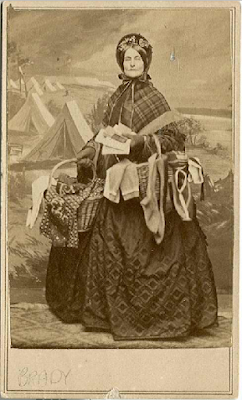In the last 25 years or so a tremendous
amount of scholarship has appeared discussing the roles of women during the
Civil War. Trailblazing studies on women who disguised themselves as men and
soldiered in camp and in combat now inform us, as do those on women who served
as spies and scouts. Other scholarship focuses on more traditional female roles
such as ladies’ aid and memorial societies and those who served in nursing and
caregiving activities.
One specific organization that emerged during the Civil War and that offered women new opportunities to make an impact on the war effort was the United States Sanitary Commission (USSC). The USSC was the largest and best organized Union soldier benevolent institution during the Civil War. And although headed by males, women were the backbone of the organization. Outside of the relatively small number of women who broke traditional female roles and served as soldiers and spies, other patriotic Union women sought to make significant contributions to the war effort. Once in the USSC or similar organizations, women used these opportunities to learn, apply, and grow new skills sets like networking, clerking, managing, and organizing.
Some women came into the ranks of the USSC with these skills already well in hand from working in pre-war social movement organizations such as women’s rights and abolition societies. Largely composed of women from upper and middle-class Northern families, female USSC workers toiled diligently to bring comforts to soldiers in the field, and support to their families on the home front. Women USSC workers organized to fund the printing of tracts meant to give soldiers advice about how to prevent diseases. They solicited donations from individuals and corporations to buy food, shelter, and medicines to supplement that provided by the U.S. military. And they tried to help soldiers transition back into civilian life after their enlistments expired, especially those suffering from extended illnesses or war-related disabilities.
After the war, many women who gained skills serving in the USSC continued their activist ways. Some utilized their grassroots organizing talents to work for women’s suffrage and campaign against child labor. The effect that these initiatives had on American society reached far beyond the four years of America’s tragic conflict, but they illustrate the power and influence individuals possess to create change.








Tim, I fairly recently did an interview with Jeanne Christie, who wrote the book The Women of City Point, Virginia, 1864-1865: http://www.beyondthecrater.com/news-and-notes/author-interview-christie-women-of-city-point/
ReplyDeleteShe covers the Sanitary Commission, the Christian Commission, and others in her book. Your post reminded me of it immediately.
Hi Brett, Thanks! I'll have to see about getting that book. It sounds right up my alley.
ReplyDelete